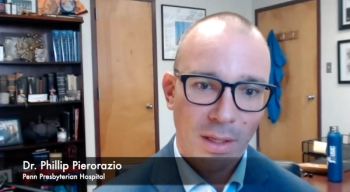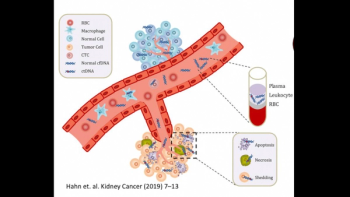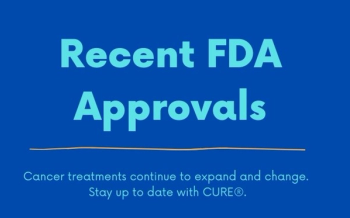
Coronary artery disease was far more common in young women with breast cancer who had radiation to their left breast than in those who had it to their right.

Brielle Benyon, Assistant Managing Editor for CURE®, has been with MJH Life Sciences since 2016. She has served as an editor on both CURE and its sister publication, Oncology Nursing News. Brielle is a graduate from The College of New Jersey. Outside of work, she enjoys spending time with family and friends, CrossFit and wishing she had the grace and confidence of her toddler-aged daughter.
Follow Brielle on Twitter @Brielle_Benyon.

Coronary artery disease was far more common in young women with breast cancer who had radiation to their left breast than in those who had it to their right.

Patients and caregivers of those with kidney cancer can become active members in their care by staying up to date on the latest treatments and medical advances.

Tivdak is a targeted therapy that showed promising results for patients with pretreated metastatic or recurrent cervical cancer.

After determining an aggressive or non-aggressive treatment approach to mantle cell lymphoma, patients and clinicians must then discuss COVID-19 vaccine efficacy when determining a maintenance treatment strategy.

Tecartus was the first CAR-T cell therapy to be approved for the treatment of recurrent mantle cell lymphoma. Now, more than a year after its approval, a doctor discusses his experience prescribing the drug.

Patients with relapsed/refractory, pretreated marginal zone lymphoma are now eligible for treatment with Brukinsa.

GC4419 plus radiation improved progression-free survival and time to distant metastases in patients with unresectable or borderline resectable locally advanced pancreatic cancer.

There are promising drugs for myeloproliferative neoplasms coming down the pipeline.

Soon after the 9/11 terrorist attacks, Judy Meyers returned to work in Manhattan, despite the terrible air quality. Years later, she was diagnosed with lung cancer, which is directly related to being in New York City in the aftermath of the destruction of the Twin Towers.

Circulating tumor DNA found in blood plasma may help predict if the likelihood of relapse for patients with large B-cell lymphoma, according to recent research.

Skin cancer rates have been increasing worldwide, and climate change factors – like depleting ozone layers – may be a factor.

One expert suggests that the FDA approval process of cancer drugs should remain but be on a case-by-case basis.

Treating lung cancer is more precise than ever, thanks to biomarker testing, which gives clinicians a better understanding of individual’s tumors.

Tecentriq plus chemotherapy did not meet the determined progression-free survival goal, so Genentech – the manufacturer of the immunotherapy agent – decided to pull the indication.

Inhibiting a cholesterol receptor could prevent a certain type of kidney cancer from growing, according to recent research.

Tibsovo — which is the first targeted therapy approved for this patient population — improved survival in patients with a subtype of liver cancer.

Patients with blood cancers may be less likely to derive immunity from the COVID-19 vaccine, though antibody tests should not be the end-all-be-all in guiding their behavior.

Acting FDA Commissioner Dr. Janet Woodcock said in a statement that hopefully the full approval of Pfizer’s COVID-19 vaccine will make people more confident in becoming vaccinated.

Combining PI3 kinase inhibitors with BTK inhibitors can mitigate side effects traditionally seen with PI3 kinase inhibitors, according to recent research.

Widowers were more likely to be diagnosed with prostate cancer that had distant metastases, according to recent research.

Adolescent and young adult patients are more represented than previously expected in clinical trials. However, their outcomes still lag behind the younger and older populations.

Multiple cancer drugs have been approved by the FDA in the last few months.

Patients on Keytruda/Lenvima lived for an average of 23.9 months without their disease progressing, compared to those on a different treatment, with an average of 9.3 months.

The COVID-19 pandemic may have worsened existing health disparities in cancer care. Vaccines may be the next step forward.

There are now more oral cancer treatments than ever, highlighting the importance of patients independently taking their drugs as prescribed.

The FDA will speed up the review of Keytruda to treat patients with kidney cancer after they’ve undergone surgery.

Treatment for acute lymphoblastic leukemia can be long and difficult at times, but the end goal is curing the disease.

Lung cancer can happen to anyone, regardless of their smoking history. Two advocates discussed the need to end the stigma around the disease.

More people are aware of the disparities LGBTQ patients face, but prohibitive legislature could be moving the needle backward when it comes to equality in care.

Blood cancer survivors are living longer than ever, making safe pain management an important concern.